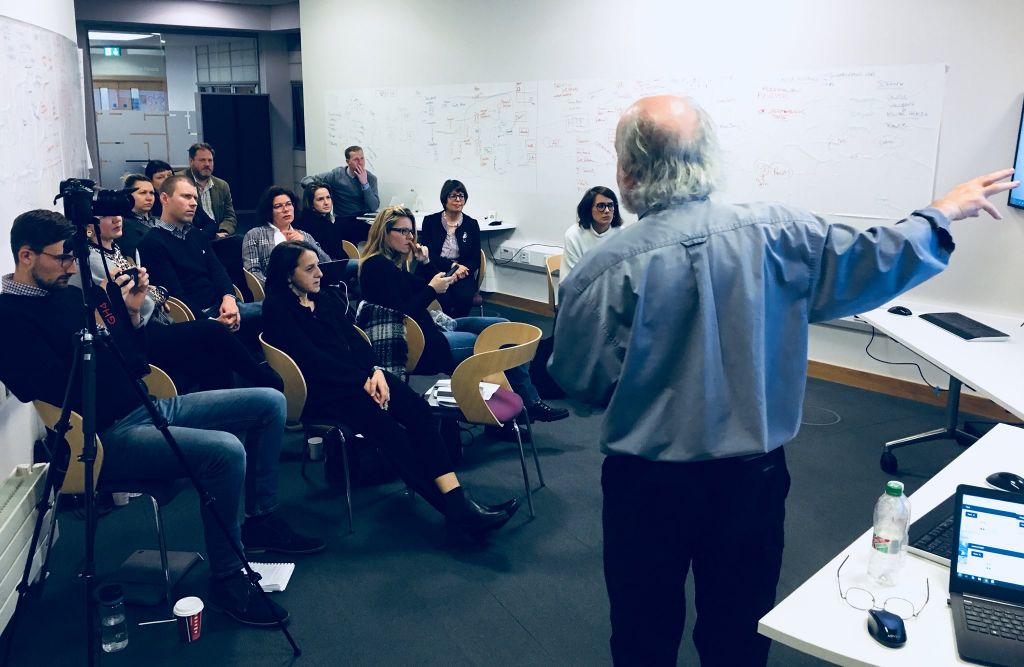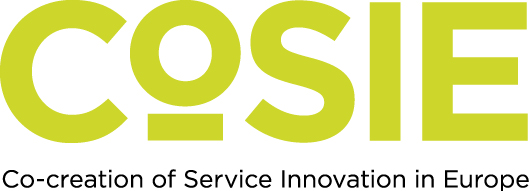Living Labbing for Social Innovation in the CoSIE Project

The Living Lab environment developed in Newcastle, UK has been explicitly created to support mutual engagement, using visualisation and animation tools. The Newcastle Living Lab at Northumbria enables organisations to innovate their relationships with their stakeholders. By analysing fundamental interactions, it can help to identify inventive approaches to ‘wicked’ problems and better ways of getting things done. It is part of the wider European network of Living Labs (ENOLL) and represents a creative and innovative approach to complex problem solving for businesses and communities through collaboration and partnership building.
The version of Living Lab intervention involved in CoSIE is built on an understanding of co-production, social learning and management theories. Our technique is holistic in terms of attempting to understand the stakeholder’s and their relation to their systems. This has been developed, over more than a decade, through a programme of externally funded research and engagement work (EU and UK). It has resulted in a set of tools and methods together with a body of theory and applied experience in areas as diverse as planning for climate change to the deployment of smartcards to designing marketplaces for adult social care. The contexts of transformation, innovation and partnership across organisational, cultural and disciplinary boundaries closely match the challenges facing those seeking to initiate complex transformational changes in social care and welfare context such as the pilots in CoSIE.
Social Innovations often fail to scale beyond the initial project or transfer to other settings. Therefore, the ability of those seeking to initiate internal and external collaborations and partnerships with service users are a key requirement for a successful social innovation. One example of this from the CoSIE project highlights how multi-agency collaboration facilitated by The Living Lab has helped the probation service in Hull. Sessions working with the lab team helped the local Interserve managers and practitioners with stakeholders understand the complex web of relationships between their work in the different parts of the system. This led to a better comprehension of what this meant in terms of the personalisation of support for the clients (low risk offenders on probation) and explaining this pilot to the service commissioning organisation (the UK Ministry of Justice).
The lab approach also supports the creation of collaborative structures and mechanisms. These are the most significant means of acting within and as a part of wider communities in order to propagate and sustain a social innovation. Addressing this issue is fundamental to the lab team’s role in the CoSIE project. The Living Labs workpackage aim is to facilitate the co-creation of shared models of the roles and relationships that surround the components of a service; and represent the model in a set of CoSIE pilot models that based on data collected from their activities. For example in the Reggio Emilia pilot lab activity on childhood obesity we supported the stakeholders to understand the implications of the intervention and the supporting governance, management and information sharing structures that are required to implement the innovation at the next level.
Within CoSIE the approach at the pilot level is that co-creation is naturally focused on the analysis of the specific intervention of each of the social innovations in the pilots and the related roles and responsibilities (including information needs and associated governance requirements) within the local context. For instance in the Jönköping pilot an issue of key importance for the pilot is the process of co-creation with target client group who are individual’s with complex needs. The underlying principles of the work of the pilot is the ‘Salutogenic’ approach (a holistic approach to care which emphasises wellbeing rather than medical cure). Engagement through the Living Lab approach supported the reflection process of the pilot and helped them to go further to define the architecture of the social innovation and the wider systems (including digital information) that support the work of the social innovation in the pilot.
The first CoSIE Knowledge Transfer workshop brought together a group of more than 30 members of the consortia to the Newcastle Living Lab based at Northumbria University. Facilitated by Newcastle Living Lab Business School’s Professors Rob Wilson and Mike Martin supported by David Jamieson and hosted in the lab we provided the platform of the collaborative learning environment via the deployment of the lab’s technology and digital tools. The combination of international researchers and practitioners from across Europe was a powerful crucible to test and develop new methods of collaboration and co-creation in the field of social innovation of public services.
The workshop’s knowledge transfer sessions enabled the CoSIE pilots and academic teams to share knowledge and characteristics of the pilots thereby improving communication between stakeholders to ensure greater inclusion, enhanced understanding and increased collaboration. Many of the challenges facing the CoSIE pilots and the social innovations they are developing can seem specific and hard to diffuse to other places and contexts. By adopting a Living Lab approach to understanding the governance and management of innovation and adaptation processes in tandem with the pragmatic work of developing solutions for multi-faceted problems such as personalisation of probation, motivating families with obese children and co-creation of care for those with complex needs.
The next challenge for the Living Lab team is working with the second Wave pilots in the consortia is to collaboratively build on the experiences in Newcastle to address the need to build capacity by shaping the application of the living lab approach and build on the initial models with partners. For more information about the Newcastle Living Lab follow us on twitter @ncllivinglab
Writer: Rob Wilson, Northumbria University
